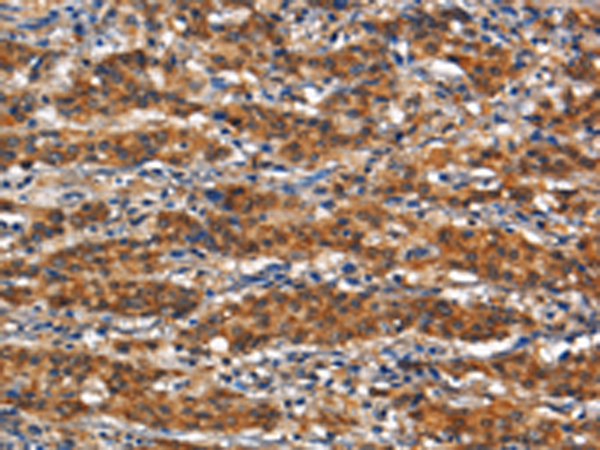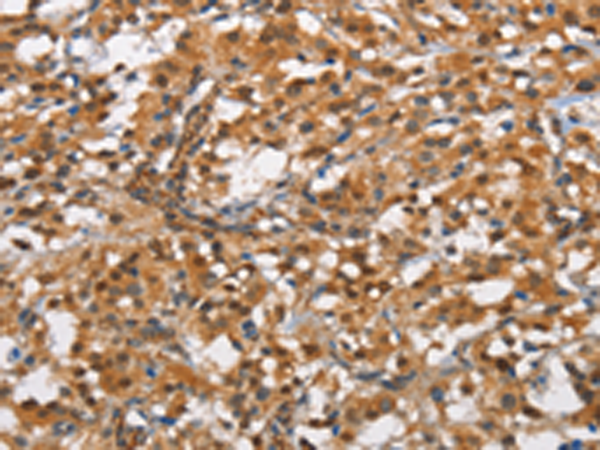

| WB | 咨询技术 | Human,Mouse,Rat |
| IF | 咨询技术 | Human,Mouse,Rat |
| IHC | 1/100-1/300 | Human,Mouse,Rat |
| ICC | 技术咨询 | Human,Mouse,Rat |
| FCM | 咨询技术 | Human,Mouse,Rat |
| Elisa | 1/2000-1/10000 | Human,Mouse,Rat |
| Aliases | APN; CD13; LAP1; P150; PEPN; GP150 |
| Host/Isotype | Rabbit IgG |
| Antibody Type | Primary antibody |
| Storage | Store at 4°C short term. Aliquot and store at -20°C long term. Avoid freeze/thaw cycles. |
| Species Reactivity | Human, Mouse, Rat |
| Immunogen | Synthetic peptide of human ANPEP |
| Formulation | Purified antibody in PBS with 0.05% sodium azide and 50% glycerol. |
+ +
以下是关于ANPEP抗体的3篇参考文献及其摘要概括:
---
1. **文献名称**:*A pathology atlas of the human cancer transcriptome*
**作者**:Uhlén M et al. (2017)
**摘要**:该研究通过大规模蛋白质组学分析,验证了ANPEP(CD13)在多种肿瘤组织中的表达模式,并开发了特异性抗体用于癌症诊断。研究发现ANPEP在急性髓系白血病和实体瘤中高表达,提示其作为潜在治疗靶点的价值。
---
2. **文献名称**:*CD13/APN is a potential therapeutic target in pancreatic cancer via the HIF-1α/VEGF axis*
**作者**:Hashida H et al. (2002)
**摘要**:研究利用抗ANPEP抗体阻断CD13的酶活性,发现其可抑制胰腺癌细胞的血管生成和肿瘤生长。实验表明,CD13通过调控HIF-1α/VEGF通路促进肿瘤血管生成,抗体干预显著减少小鼠模型中肿瘤体积。
---
3. **文献名称**:*CD13 is a mediator of inflammatory signaling in coronavirus entry*
**作者**:Hussain M et al. (2022)
**摘要**:该研究揭示ANPEP(CD13)作为人类冠状病毒HCoV-229E的功能性受体,并通过抗体阻断实验证明CD13抗体可有效抑制病毒入侵宿主细胞,为抗病毒治疗提供了新策略。
---
4. **文献名称**:*CD13 regulates dendritic cell cross-presentation and T cell responses by inhibiting receptor-mediated antigen uptake*
**作者**:Mina-Osorio P et al. (2008)
**摘要**:研究利用抗CD13抗体探究其在免疫调控中的作用,发现CD13通过抑制树突状细胞抗原摄取,影响T细胞激活,提示其在炎症性疾病和疫苗开发中的潜在应用。
---
以上文献涵盖了ANPEP抗体在癌症、病毒感染及免疫调控中的关键研究,均通过抗体实验验证其功能或治疗潜力。
The ANPEP antibody targets the alanyl aminopeptidase (ANPEP) protein, also known as CD13 or aminopeptidase N (APN). ANPEP is a membrane-bound metalloprotease that cleaves N-terminal amino acids from peptides, regulating bioactive molecules like cytokines, hormones, and neuropeptides. It is widely expressed in epithelial, endothelial, and immune cells, including myeloid cells and activated lymphocytes. Functionally, ANPEP participates in processes such as antigen processing, cell migration, angiogenesis, and inflammation.
In research, ANPEP antibodies are used to study its roles in cancer, infectious diseases, and immune regulation. Overexpression of ANPEP is observed in certain cancers (e.g., acute myeloid leukemia, renal, and colon carcinomas) and correlates with tumor progression, metastasis, and drug resistance. It also serves as a receptor for coronaviruses, including human coronavirus 229E. Additionally, ANPEP is implicated in modulating immune responses by influencing T-cell activation and cytokine signaling.
Clinically, ANPEP antibodies are utilized in diagnostic assays (e.g., flow cytometry, immunohistochemistry) to identify ANPEP-positive cells in tissues or blood. Therapeutic applications are being explored, such as antibody-drug conjugates targeting ANPEP in cancer therapy. Its dual role as a protease and signaling molecule makes ANPEP a multifaceted biomarker and potential therapeutic target in oncology and immunology.
×